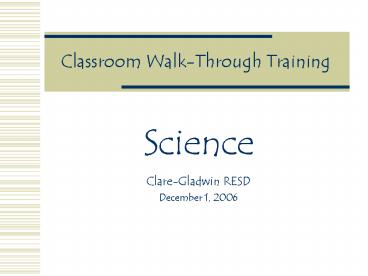Classroom WalkThrough Training - PowerPoint PPT Presentation
1 / 25
Title:
Classroom WalkThrough Training
Description:
To begin with the end in mind means to start with a clear understanding ... Exploratorium. http://www.exploratorium.edu/ Video Clips for Professional Learning ... – PowerPoint PPT presentation
Number of Views:78
Avg rating:3.0/5.0
Title: Classroom WalkThrough Training
1
Classroom Walk-Through Training
- Science
- Clare-Gladwin RESD
- December 1, 2006
2
Begin With the End in Mind
- To begin with the end in mind means to start
with a clear understanding of your destination.
It means to know where youre going so that you
better understand where you are now so that the
steps you take are always in the right direction. - Stephen Covey
- Seven Habits of Highly Effective People
3
Session Overview
- Todays session will
- Identify what best practice looks like in a
science classroom - Share implementation tools for Three-Minute
Classroom Observations - Provide the opportunity to practice preparation
and delivery of reflective questions - Review the latest initiatives in science education
4
Best Practice in Science
- Scientific Proficiency Requires
- Adapting the curriculum
- Building understanding
- Promoting inquiry
- Assessing science literacy
5
Best Practice Findings
- Less
- Whole class, teacher directed instruction
- Student passivity
- More
- Experiential, inductive, hands-on learning
- Active learning
6
Lets Investigate with Spinners
- Go to your assigned Station A, B, or C
- Focus Question How does change in speed or
direction relate to balanced or unbalanced
forces? - Identify and Record on Easel Paper
- Level of Teacher/Learner Control
- Science Content Addressed
- Process Skills Needed and/or Developed
7
Teacher and Learner Roles
- Who has control over the question or problem
being addressed? - Who has control over the procedure or aspects of
the procedure? (materials/data) - Who has control over the outcome? Is it an
open-ended problem with multiple solutions or is
there only one right answer?
8
Standards and Benchmarks
- Strand 1. Constructing New Scientific Knowledge
- Strand 2. Reflecting on Scientific Knowledge
- Strand 3. Using Scientific Knowledge in Physical
Science - Standard IV.3 Motion of Objects
- All students will describe how things around us
move and explain why things move as they do
demonstrate and explain how we control the
motions of objects and relate motion to energy
and energy conversions. - IV.3.MS.2 Relate changes in speed or direction
to unbalanced forces in two dimensions.
9
Moving from Facts to Concepts
Motion of Objects Facts Topics Concepts
Newtons Forces Cause
Effect First Law Time Organization
Measurement Structure/Function
10
Process Skills
- Observing
- Questioning
- Hypothesizing
- Predicting
- Planning and Investigating
- Interpreting
- Communicating
11
So What Is Inquiry?
- A process by which we pose questions about a
topic or situation and attempt to answer those
questions by making inferences about the data and
information we acquire. A process which requires
us to engage in problem solving, decision making,
creative thinking and the formulation of new
concepts. - National Science Education Standards
12
Inquiry in the Classroom
- Observing
- Questioning
- Constructing the Investigation
- Conducting the Investigation
- Communicating the Investigation
13
Implementation Tools
- The Abilities to Do Scientific Inquiry
- Questions to Encourage Process Skills
- Bookmarks/Flip Chart
- NAEP
- http//www.nagb.org/
14
Implementation Tools
- K-8 Science Investigations linked to MCF
- http//imc.lisd.k12.mi.us/Resources/Science
Investigations.html - Exploratorium
- http//www.exploratorium.edu/
- Video Clips for Professional Learning
- http//www.learner.org
15
Walk-Through Observation Steps
- Walk-Through Observation Steps
- Student Orientation to the Work
- Do students appear to be attending when you first
walk into the room? - Curricular Decision Points
- What objective/s has the teacher chosen to teach
at this time and how aligned are they to the
GLCEs or HSCEs? - Instructional Decision Points
- What instructional practices is the teacher
choosing to use at this time to help students
achieve the learning of the curriculum
objectives? - Walk-the-Walls Curricular and Instructional
Decisions - What evidence is there of past objectives taught
and/or instructional decisions used to teach the
objectives that are present in the room? - Safety and Health Issues
- Are there any noticeable safety or health issues
that need to be addressed?
16
High School Science
- http//www.learner.org/resources/
17
Reflective Conversation
- What is the focus of the feedback?.
- Trust building, teaching/learning objectives,
thinking levels, text/materials, instructional
strategies, learner engagement, learning
environment - What question will you ask for the teacher to
examine beliefs, goals, and practices?
18
Middle School Science
- http//www.learner.org/resources/
19
Dialogue for Growth
- Identify the feedback focus.
- Trust building, teaching/learning objectives,
thinking levels, text/materials, instructional
strategies, learner engagement, learning
environment - Determine the prompt for the teacher to examine
beliefs, goals, and practices.
20
Initiatives in Science
- Grade Level Content Expectations K 7
- Fall 2007
- Performance-based for assessment
- Two-year implementation
- Evaluating Current Programs K - 7
- Continue with current practice
- Evaluate using NAEP 2009
- Consider back mapping implications
21
(No Transcript)
22
MME Science Components
- ACT
- 40 multiple choice items
- Measures skills in these areas
- Interpretation
- Analysis
- Evaluation
- Reasoning
- Problem Solving
- Michigan Developed
- 50 multiple choice items
- Currently based on MCF
- Timed (50 minutes)
- HSCE fully assessed Spring 2008
23
ACT Science
- Scientific information in three formats
- Data Representation
- Research Summaries
- Conflicting Viewpoints
- Test items require students to
- Examine the relationships between the information
provided and the conclusions drawn or hypotheses
developed. - Generalize from information provided to gain new
information, draw conclusions or make predictions.
24
ACT Science (40 MC items)
25
(No Transcript)































